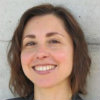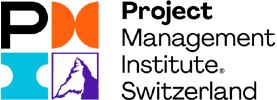Author: Chiara Nenci, PMP

Basel, 21st March 2017
What is creativity, can it be developed and are we all capable of being creative?
We explored answers to these questions, and more, during a highly interactive session with our speaker Eli Fumoto - coach, facilitator and PMP.
Creativity typically leads to something original, meaningful and useful. Literally anything intangible or object-like satisfying those qualities can be claimed to be creative. As such, creativity is deeply embedded in our everyday life and as human beings we continuously use it, often unconsciously, to pursue our personal and professional ventures.
Creativity is also highly complex and hard to quantify. And even though we are all able to be creative, we are not automatically so.
Creativity is in fact a “habit” that can and must be exercised in order to flourish. The brain is quite obviously the “muscle” that must work out to develop capabilities such as diagnosing gaps and difficulties and seeking solutions. So if you think you are not creative, you may simply not be training your brain enough. But how can we change ourselves from being lazy practitioners to creativity advocates and habitués?
Eli Fumoto explains how to make creativity a daily habit.
An exploration of our personal attitude to creativity, our learning style and our own preferences could be used to identify a set of individual creative habits, which should be practised daily in order to build our confidence in being able to increase our creativity.
In order to develop what Eli defined as “our own creative device”, we must:
1) Have a deep level of self-awareness;
2) Observe what happens around us;
3) Use enough time and the appropriate space to reflect;
4) Be committed to change and learn.
Creativity is thus a high expression of our truest, most authentic self. It seems in fact that human beings become fully engaged, efficient and resourceful, only when they think on their own and have complete control over their decision power: as an example Eli mentioned that people often read self-help books but never implement this written advice, possibly because it originates from the authors’ individual habits, not from those of their readers.
Following the sharing of these ideas and guidelines, Eli paused and gave the opportunity to each attendant to identify and write down 3 creative habits to be implemented in one’s daily routine.
The attendants writing down their creative habits.
Further into the evening, we were introduced to the concept of “thinking environment” – a high quality communication flow happening between two persons. Working in couples, one person listened with sustained attention and without interrupting the other’s speech; then the roles of listener-thinker vs. speaker were switched and eventually both expressed appreciation for each other. While practising this little exercise, we directly experienced how the creative engagement of the listener increases as he/she must listen without distraction, emitting a sound or turning away from the speaker. In essence, it is a “think before speaking” approach which limits the expression of insecurities and fosters better collaboration. While sharing afterwards experiences and challenges encountered during this exercise with the rest of the audience, many were highly appreciative of having been listened to, or found it very challenging having had to remain silent; some used their creativity to find about what to say, while others used it to break the rules established for each role!
At the end of Eli’s highly engaging presentation, we were all left with the following closing remarks:
- Everybody is creative, each in his/her own unique way, and at any age
- Creativity must be constantly exercised
- Project management is a highly creative profession. The PMBOK offers standardized guidance but it is up to the project manager and the team members to find the best way to drive their unique project. By showing the most creative and committed self in an environment where the quality of communication is high, a project manager can establish strong collaborative ties and truly set the team on the path to success.
Lucy Osoegawa, the host of the event, thanking Eli for the inspirational talk.
The conversation on creativity continued during the networking aperitif.
For additional questions on the event or other inquiries, please feel free to contact Eli via:
LinkedIn https://www.linkedin.com/in/elifumoto
Website: http://www.eli-fumoto.com





